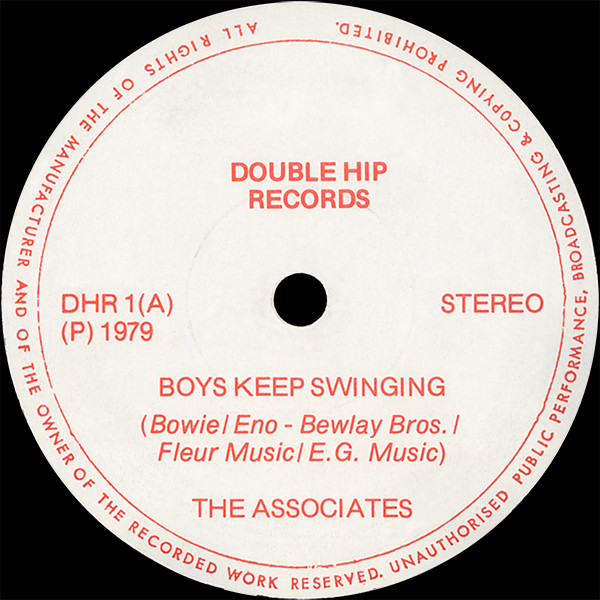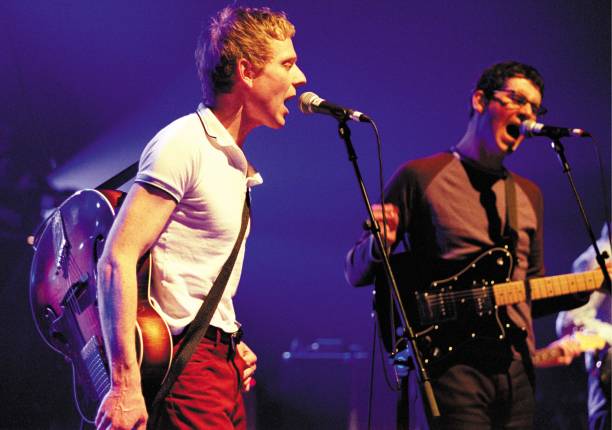RIP The Associates' Alan Rankine
Around this time last year I started a small piece to mark the 25th anniversary of Billy Mackenzie's death, the former lead singer of the Scottish post-punk band The Associates who died on 22nd January 1997, leaving us with short but stunning legacy, all wrapped around an incredible four-and-a-half octave voice.
I regrettably never published it at the time and with the sad news a few weeks ago of the passing of Alan Rankine, Mackenzie's co-founding Associate colleague I thought I best to revisit it and finish it off (so here we are :D). My reaction to the news reminded me of the kind of group The Associates were in their first incarnation - uncompromisingly single minded, esoteric and alas quite brief; a brilliant 3 albums - if you include their singles compilation Fourth Drawer Down - in a little over 22 months. And all the music written and recorded by Alan Rankine, every last instrument, solo, electronic synth and guitar riff.
A quick glance online backs up their cult status - their legacy primarily only extends to members of the public with a passion for music or are musicians themselves. Two appearances on Top Of The Pops in 1982 were it in terms of hits and whilst its parent album Sulk did win critical praise - including Melody Maker's album of the year - any momentum at the time was lost when on the verge of a US tour, Mackenzie decided to pull out, subsequently leading to his band mate multi- instrumentalist Alan Rankine quitting in frustration. Whilst Mackenzie did continue with the Associates name, it was not the same, with Rankine's highly original and quirky post-punk rock and electronic musings replaced with Mackenzie's taste for lounge jazz and torch bearer soul which led to a drop in quality after the high watermarks of their earlier output (some of these later efforts were rejected by labels at the time including 1989's The Glamorous Chase).
I am about to repeat a most disliked phrase but with good reason. Having been born in the year of Sulk, I was never going to have heard of them - they were before my time! - with no continuation of their legacy, a complete lack of radio air time, how else could I have heard of them? Looking back now it is clear that there is another reason - they were so very off kilter to the point that they couldn't be repeated. It is wrong to say they didn't influence anyone because they did - Bjork and U2 just two artists who have confirmed their influence whilst Ladytron put their very existence down to them - but if anything the influence was less about music than ambition and outlook, making them harder to mould and to copy. They were in short one offs.
I first came across the band via a late nineties' re-release of their catalogue which was reviewed beautifully by Simon Reynolds in Uncut magazine but I never pursued it. In the pre-internet and streaming days it was more difficult to buy music on a whim particularly if you already had your own bands and styles you avidly followed (my beloved Radiohead, Verve and Oasis were centre stage in my life at the time along with a long supporting cast of indie bands). Said review however always stayed with me because in the intervening years I've always been curious about new - not necessarily recent - music and because I love dance music, almost as much as Simon Reynolds and yes his Energy Flash book is an excellent read. It was in a similar edition of the magazine that Reynolds had also reviewed a UK Garage compilation which also stuck with me as my tastes took a marked change when I went to university and discovered clubbing culture and this new sub-genre of British dance music about to go overground.
So years later, on a whim I curiously decided to listen to The Affectionate Punch and I'm now a starstruck fan. The feeling was akin to discovering your favourite new band. Except their debut was released 42 years ago (!) in 1980, only a few months after their debut single, an audaciously quick, stripped back cover of Bowie's Boys Keep Swinging.
In my driftwood of a previous draft, the intention was to review one particular song but it just seems abit crass to focus on one song when each of their first three releases - 1980's The Affectionate Punch, 1981's Fourth Drawer Down and 1982's Sulk - are brilliant. Described by Paul Morley as 'some kind of masterpiece', their debut was akin to Joy Division but with perhaps more mystery and more soul. The 1981 compilation Fourth Drawer Down collected all that year's six singles, the standout arguably being the cold synth jabs of White Car in Germany, a stunning glimpse into life at the height of the cold war. Sulk followed, both their critical and commercial peak. Upon its re-release Reynolds coined it 'Abba on acid' in said Uncut reviews and its harder to think of a better description; Mackenzie's beautiful voice and Rankine's instrumental virtuosity allowed them to be as pop as Abba, whilst the high standards they set themselves, in part to emulate their heroes, meant being brave and taking risks. It resulted in music that was in effect out of time and ahead of its time. A more contemporary description might be 'Arctic Monkeys fronted by Sam Smith' - the adventurous rock core, fronted by a diva.
Rankine's post Associates life was almost as eventful. After quitting the Associates in frustration at Mackenzie's unwillingness to tour the US, Rankine turned to working with others, cementing himself as a competent music producer, producing artists such as Paul Haig, Cocteau Twins and The Pale Fountains before becoming a lecturer at Stow College in Glasgow where he became a professor and drove the creation of their inhouse record label Electric Honey which led to a number of new artists starting out not least another of my favourite bands Belle & Sebastian. Clearly the Scottish trait of leading a civic life and giving back to society was something Rankine did with aplomb.
Now it's time for Rankin and Mckenzie to make music again, perhaps to play the beautiful Logan Time again whilst a new generation of fans discover their unique and fascinating world:




Comments
Post a Comment